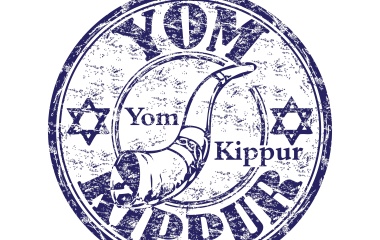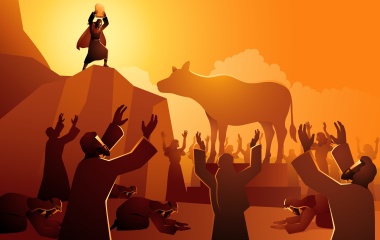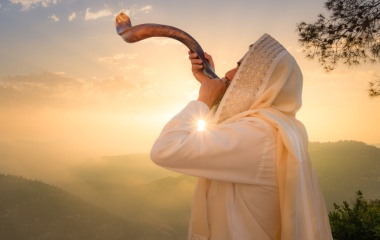
Our society worships greatness. Whether it be athletes, rock stars, actors or successful business leaders, they are showered with wealth and adulation and pampered wherever they go. People pay great sums of money to be in the presence of, or acquire an object once used by, the perceived greats of our society.
Attaching oneself to greatness is indeed a most noble and worthy endeavour. It is why Biblical exegesis has interpreted the verse, "You shall fear the Lord your G-d and worship Him, cling to Him" (Devarim 10:20), as a reference to Torah scholars, who evoke feelings of inspiration, piety and greatness (Kiddushin 57a).
Yet ultimate greatness can only be found in the Divine: "a great, mighty and awesome G-d" (Devarim 10:17).
On Yom Kippur, as we stand in the presence of G-d—"Before G-d you shall purify yourself" (Vayikra 16:30)—we are granted a wonderful opportunity to achieve greatness. Paradoxically, greatness is a most humbling experience, as we realize the enormous gap between it and ourselves. When we encounter G-d it is doubly humbling, recognizing the unbridgeable gap between man and G-d. Moshe, having experienced greatness like no other, was thus the most humble of men. It is this combination of greatness and humility that leads to joy and contentment.
Historically, Yom Kippur marks the forgiveness granted the Jewish people for the sin of the golden calf. G-d, in granting the great gift of teshuva even for the most heinous of sins, also granted us the "formula" to use when we are in need of forgiveness.
“And the Lord passed by before him [Moshe], and proclaimed” (Shemot 34:6). Rabbi Yoḥanan said: If it had not been written, it would be impossible to say this. It teaches that the Holy One, Blessed be He, wrapped Himself like a prayer leader and showed Moshe the the order of the prayer service. He said to him: Whenever the Jewish people sin, let them act before Me in accordance with this order and I will forgive them” (Rosh Hashanah 17b).
In explaining this gross anthropomorphism, the Talmud asserts that, by reciting the 13 attributes of mercy, something we do over and over again during the High Holiday season[1], G-d will grant the Jewish people forgiveness for their sins. “Rav Yehuda said: A covenant was made with the thirteen attributes that they will not return empty-handed.”
Clearly, the Talmud does not mean to imply that by reciting some kind of "magic formula", even with great sincerity or intensity, we can attain forgiveness. The haftara chosen by our Sages for the morning of Yom Kippur reads, "Is such the fast that I have chosen a day for a man to oppress himself? Is it to bow down his head as a bulrush, and to spread sackcloth and ashes under him? is this what you call a fast, and an acceptable day to the Lord? No; this is the fast that I choose - to loosen the bindings of evil, and break the slavery chain. To let the oppressed go free, and to break every yoke. To feed bread to the hungry, and to bring the poor into your house. When you see the naked, clothe him; do not avert your eyes from your own flesh" (Yishayahu 58:5-7).
It is not saying the thirteen middot that gains one atonement; it is doing them that guarantees G-d will hear our prayers[2]. "What is the meaning of the text: You shall walk after the Lord your God?(Devarim 13:5)...Rather, one should follow the attributes of the Holy One, Blessed be He. Just as He clothes the naked...so too, you clothe the naked. The Holy One, Blessed be He, visits the sick...so too you visit the sick. The Holy One, Blessed be He, consoles mourners...so too, you console mourners. The Holy One, Blessed be He, buried the dead...so too, you bury the dead" (Sotah 14a).
Not only are we to act like G-d, but we are to, kveyachol, be like G-d. "'Ve'anveihu, and I will adorn Him' (Shemot 15:2): Abba Saul interpreted [this to mean], 'and I will be like Him [3]; just as He is gracious and compassionate, so you shall be gracious and compassionate'" (Shabbat 133b).
"There were no days as joyous for Israel as that of Yom Kippur and the fifteenth of Av" (Taanit 26b). It is the day of the re-establishment of the covenant, "a day of forgiveness, of pardon, and the day the Torah was given". It is the day we ignore our human needs and limitations as we soar to the heavens, joining with the angels in offering praise to G-d. It is the day our Divine image is most manifest. And most importantly, it is the day that must inspire us on all the other days of the year.
The divine image that resides within each one of us affords us the opportunity to reach higher and higher levels of greatness. Like our athletes, rock stars, actors, or great business leaders, we must constantly work at being the best, searching out each and every angle that will allow us to grow. It requires long hours, hard work and complete dedication. But it is well worth the effort.
[1] While most of our Machzorim only have us reciting the thirteen middot at Maariv and Neilah only, Rabbi Soloveitchik was insistent that they be said during each of the five prayer services of Yom Kippur. In those minyanim that follow his ruling, special selichot are added in Shacharit, Mussaf, and Mincha, followed by the thirteen middot.
[2] Notably, Rav Yochanan teaches that "ya'asuh k'seder hazeh, they should do this order". Saying is not enough.
[3] The teaching is much stronger in the Hebrew; ve'anveihu, can be read as ani vehu, me and Him, or "I am like Him".



